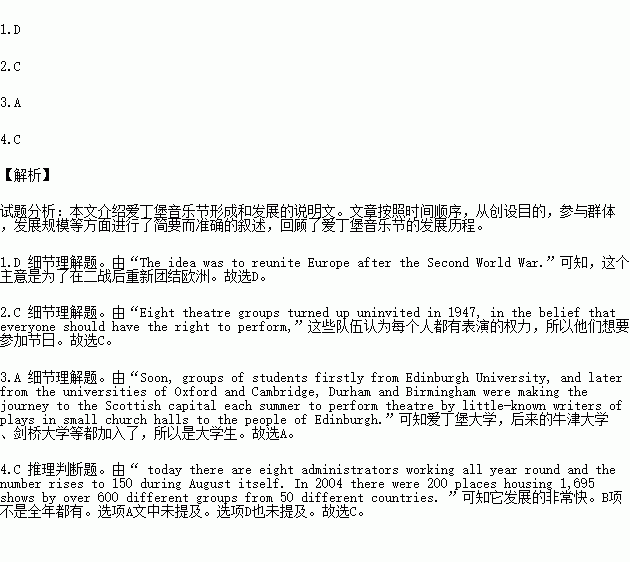题目内容
In 1947 a group of famous people from the art world headed by an Austrian conductor decided to hold an international festival of music, dance and theatre in Edinburgh. The ida was to reunite Europe after the Second World War.
It quickly attracted famous names such as Alec Guinness, Richard Burton, Dame Margot Fonteyn and Marlene Dietrich as well as the big symphony orchestras(交响乐团). It became a fixed event every August and now attracts 400,000 people yearly.
At the same time, the “Fringe” appeared as a challenge to the official festival. Eight theatre groups turned up uninvited in 1947, in the belief that everyone should have the right to perform, and they did so in a public house disused for years.
Soon, groups of students firstly from Edinburgh University, and later from the Universities of Oxford and Cambridge, Durham and Birmingham were making the journey to the Scottish capital each summer to perform theatre by little-known writers of plays in small church halls to the people of Edinburgh.
Today the “Fringe”, once less recognized, has far outgrown the festival with around 1,500 performances of theatre, music and dance on every one of the 21 days it lasts. And yet as early as 1959, with only 19 theatre groups performing, some said it was getting too big.
A paid administrator(管理人员) was first employed only in 1971, and today there are eight administrators working all year round and the number rises to 150 during August itself. In 2004 there were 200 places housing 1,695 shows by over 600 different groups from 50 different countries . More than 1.25 million tickets were sold.
1.What was the purpose of Edinburgh Festival at the beginning?
A. To honor heroes of World War II
B. To introduce young theatre groups
C. To attract great artists from Europe
D. To bring Europe together again
2.Why did some uninvited theatre groups come to Edinburgh in 1947?
A. They came to take up a challenge
B. They thought they were also famous.
C. They wanted to take part in the festival
D. They owned a public house there
3.Who joined the “Fringe” after it appeared?
A. University students
B. Artists from around the world
C. Performers of music and dance
D. Popular writers
4.We may learn from the text that Edinburgh Festival .
A. has gone beyond an art festival
B. gives shows all year round
C. keeps growing rapidly
D. has become a non-official event

